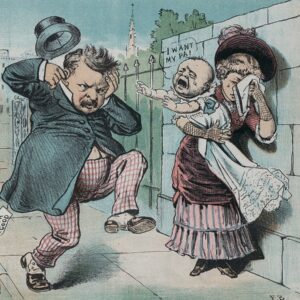HOLY COW! HISTORY: In Politics, the Slogan Sells It

What do presidential campaigns and the Christmas shopping season have in common? They both keep starting earlier and earlier.
For better or worse, the 2024 presidential campaign is underway — 14 months before the November general election. Political strategists are busy devising slogans for their candidates. This makes a good time to look back at how slogans have evolved over the years.
Long before there were car bumpers to affix stickers to, politicians were coming up with phrases designed to win votes. Some worked (“Make America Great Again!”). Some didn’t (“Jeb!”). See for yourself in this stroll down Political Memory Lane.
1840: “Tippecanoe and Tyler Too” Some historians call this the first campaign slogan. William Henry Harrison’s claim to fame was defeating Shawnee Chief Tecumseh in the 1811 Battle of Tippecanoe in Indiana. His supporters took to calling him “Old Tippecanoe.” Harrison won the election and immediately set a record no president wants to break: He died 30 days after taking office.
1844: “54-40 or Fight!” This slogan expressed James K. Polk’s position in settling a border dispute in the Pacific Northwest. The line was snappy, and Polk won. But in the end, we didn’t get that border with modern Canada (it was drawn at 49 instead of 54 degrees parallel). And we didn’t fight, either. Still, Americans apparently liked it better than the slogan of Polk’s rival: “The Country’s Risin’ for Henry Clay and Frelinghuysen!” (Clunky as it was, I dare you to find a better rhyme for running mate Felix Frelinghuysen.)
1852 “We Polked you in ’44, We shall Pierce you in ’52” After having lost in 1848, Democrats found a clever way to connect the largely unknown Franklin Pierce to their last victorious candidate. A little long by today’s standards, but it worked.
1856 “Free Soil, Free Labor, Free Speech, Free Men, Fremont” This was the first presidential run for the brand-new Republican Party. GOP strategists came up with this slogan to associate the party’s anti-slavery views with its standard bearer, John C. Fremont. He didn’t make it to 1600 Pennsylvania Avenue, but his infant party did in the next election.
1868 “Let Us Have Peace” Here’s a rare slogan that originated with the candidate himself. The country was exhausted from four years of Civil War. Though the shooting had stopped three years earlier, deep divisions remained. Republicans picked Ulysses Grant, the “Hero of Appomattox” in Northern eyes, as their presidential nominee. Back then, candidates didn’t attend political conventions. So his advisers drafted a letter accepting the nomination. Grant read it, picked up a pen, and added, “Let us have peace.” Republican strategists knew a good thing when they saw one and ran with it all the way to the White House. (Unfortunately, historians rank Grant as one of the worst presidents.)
1884 “Ma, ma, where’s my pa?” By any standard, the election of 1884 was one of the nastiest, dirtiest campaigns ever. Democrat Grover Cleveland, a bachelor, admitted fathering a child out of wedlock. That was a huge no-no in the Victorian Era. Republicans taunted Democrats by shouting, “Ma, ma, where’s my pa?” But Cleveland’s supporters had the last laugh. When their man won they added, “Gone to the White House, ha, ha, ha!”
1888 “Grandfather’s hat fits Ben” This one definitely wouldn’t inspire 21st-century voters. Some Republican pol devised it to remind Americans that Benjamin Harrison’s grandfather was William Henry (of earlier “Tippecanoe and Tyler Too” fame). In a result we can relate to today, Harrison defeated Grover Cleveland in the Electoral College but lost the popular vote. See how history repeats itself?
1892 “Our Choice: Cleve and Steve” Whatever else Cleveland was, he wasn’t a quitter. When he ran for his old job a third time in 1892, Democrats campaigned on “Cleve and Steve,” a reference to running mate Adlai Stevenson. While hardly inspiring, it was good enough to carry Cleveland to a second non-consecutive term, forever messing up presidential numbering in the process. (Stevenson, by the way, was the grandfather of Adlai Stevenson II, who was the Democrats’ 1952 and 1956 presidential candidate. Grandpa won; the grandson didn’t.)
1896 “Peace, Protection, and Prosperity” When all else fails, alliteration always works. Republicans relied on the Three P’s to communicate William McKinley’s platform to voters. And it put the GOP back in the White House, where it would remain 28 of the next 36 years.
And perhaps in the not-too-distant future, we’ll see the slogan …
“A.I. for President: We’re taking over, anyway.”


